英语听力
- 格式:doc
- 大小:54.00 KB
- 文档页数:7
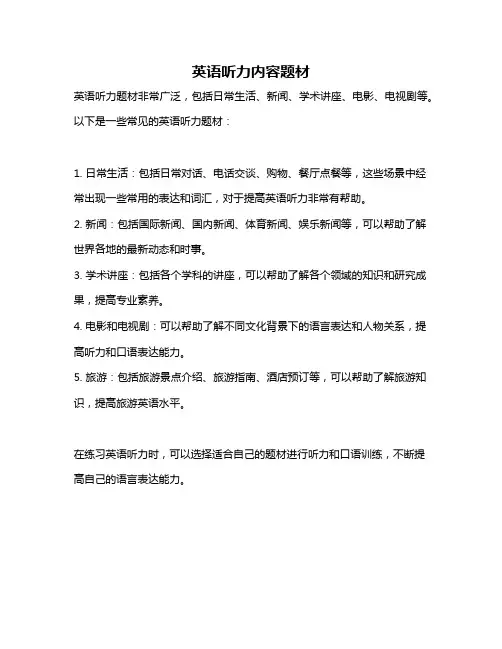
英语听力内容题材
英语听力题材非常广泛,包括日常生活、新闻、学术讲座、电影、电视剧等。
以下是一些常见的英语听力题材:
1. 日常生活:包括日常对话、电话交谈、购物、餐厅点餐等,这些场景中经常出现一些常用的表达和词汇,对于提高英语听力非常有帮助。
2. 新闻:包括国际新闻、国内新闻、体育新闻、娱乐新闻等,可以帮助了解世界各地的最新动态和时事。
3. 学术讲座:包括各个学科的讲座,可以帮助了解各个领域的知识和研究成果,提高专业素养。
4. 电影和电视剧:可以帮助了解不同文化背景下的语言表达和人物关系,提高听力和口语表达能力。
5. 旅游:包括旅游景点介绍、旅游指南、酒店预订等,可以帮助了解旅游知识,提高旅游英语水平。
在练习英语听力时,可以选择适合自己的题材进行听力和口语训练,不断提高自己的语言表达能力。
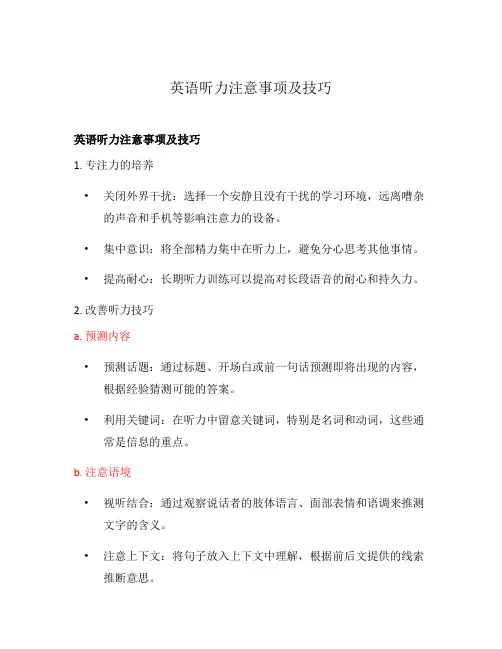
英语听力注意事项及技巧英语听力注意事项及技巧1. 专注力的培养•关闭外界干扰:选择一个安静且没有干扰的学习环境,远离嘈杂的声音和手机等影响注意力的设备。
•集中意识:将全部精力集中在听力上,避免分心思考其他事情。
•提高耐心:长期听力训练可以提高对长段语音的耐心和持久力。
2. 改善听力技巧a. 预测内容•预测话题:通过标题、开场白或前一句话预测即将出现的内容,根据经验猜测可能的答案。
•利用关键词:在听力中留意关键词,特别是名词和动词,这些通常是信息的重点。
b. 注意语境•视听结合:通过观察说话者的肢体语言、面部表情和语调来推测文字的含义。
•注意上下文:将句子放入上下文中理解,根据前后文提供的线索推断意思。
c. 针对细节•注意特殊词汇:关注特殊词汇的发音、拼写和意义,可以加强对话题的理解。
•区分近义词:细心辨别近义词的差异,了解不同词语在不同语境中的用法。
d. 收听不同口音•增加听力素材:尝试听取不同地区的英语口音,扩大对不同发音和语速的适应能力。
3. 提高听力技能的方法a. 多听多练•听力材料选择:选择适合自己英语水平和兴趣的听力材料,如TED Talks、BBC节目等。
•多样化题材:涉及不同领域和话题的听力练习,有助于熟悉各种词汇和表达方式。
b. 听力笔记的技巧•笔记要点:将重要内容或关键词写在笔记中,以便后续复习和巩固记忆。
•笔记简洁明了:用简洁的短语或关键词进行记录,避免过于冗长而导致错过内容。
c. 利用辅助工具•听力软件:使用配有字幕功能的软件进行听力练习,同时借助字幕辅助理解。
•慢速播放:将听力材料在较慢的速度下播放,逐渐增加速度以提高听力反应能力。
通过以上注意事项和技巧,你可以有效地提高英语听力水平,并更好地理解和运用所听取的内容。
不断的练习和积累经验,你将逐渐成为一个优秀的英语听力者。
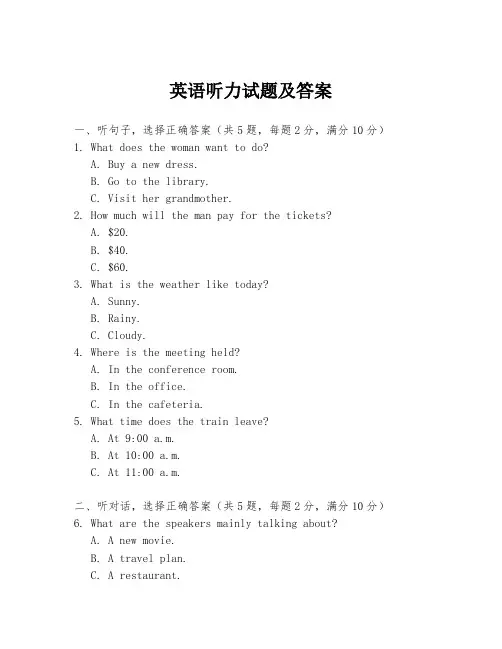
英语听力试题及答案一、听句子,选择正确答案(共5题,每题2分,满分10分)1. What does the woman want to do?A. Buy a new dress.B. Go to the library.C. Visit her grandmother.2. How much will the man pay for the tickets?A. $20.B. $40.C. $60.3. What is the weather like today?A. Sunny.B. Rainy.C. Cloudy.4. Where is the meeting held?A. In the conference room.B. In the office.C. In the cafeteria.5. What time does the train leave?A. At 9:00 a.m.B. At 10:00 a.m.C. At 11:00 a.m.二、听对话,选择正确答案(共5题,每题2分,满分10分)6. What are the speakers mainly talking about?A. A new movie.B. A travel plan.C. A restaurant.7. Why does the man refuse the woman's invitation?A. He is too busy.B. He has to work.C. He doesn't like her.8. What is the woman's opinion about the book?A. It's boring.B. It's interesting.C. It's too long.9. What does the man suggest doing?A. Going to the gym.B. Watching a movie.C. Cooking dinner.10. What is the relationship between the speakers?A. Teacher and student.B. Boss and employee.C. Friends.三、听短文,选择正确答案(共5题,每题2分,满分10分)11. What is the main topic of the passage?A. Environmental protection.B. Technological advancement.C. Cultural exchange.12. How many countries are mentioned in the passage?A. Two.B. Three.C. Four.13. What is the speaker's purpose in the passage?A. To inform.B. To persuade.C. To entertain.14. What does the speaker think about the future?A. It's promising.B. It's uncertain.C. It's challenging.15. What is the speaker's recommendation?A. To take action immediately.B. To wait and see.C. To do more research.四、听填空,根据所听内容填写信息(共5题,每题2分,满分10分)16. The museum is open from _______ to _______ on weekdays.17. The _______ is the most popular exhibit in the museum.18. The _______ is the best time to visit the museum.19. The museum offers free admission on _______.20. The museum is located at _______ Street.五、听写句子,根据所听内容写出完整的句子(共5题,每题2分,满分10分)21. The _______ is the most important event of the year.22. _______ is the best way to learn a new language.23. The _______ has been closed due to the storm.24. _______ is the capital of _______.25. _______ is the most famous landmark in the city.答案:一、1-5 C B A B A二、6-10 B A B A C三、11-15 A B A A A四、16. 9:00 a.m.; 5:00 p.m. 17. The dinosaur exhibit 18. During the weekdays 19. Tuesday 20. Main五、21. Annual conference 22. Immersion 23. The airport 24. Washington D.C.; United States 25. The Eiffel Tower。
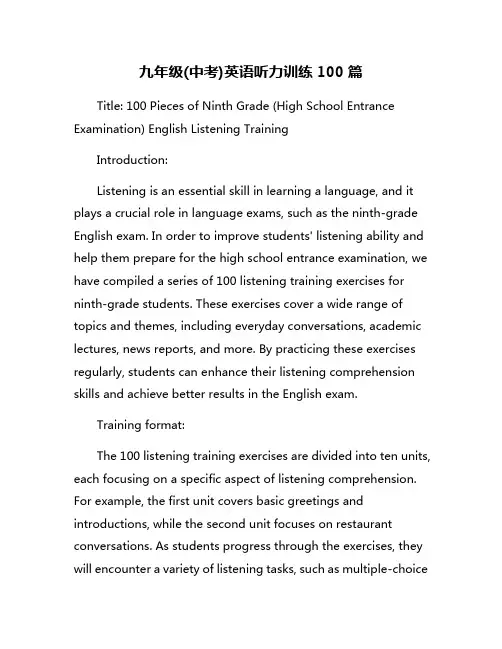
九年级(中考)英语听力训练100篇Title: 100 Pieces of Ninth Grade (High School Entrance Examination) English Listening TrainingIntroduction:Listening is an essential skill in learning a language, and it plays a crucial role in language exams, such as the ninth-grade English exam. In order to improve students' listening ability and help them prepare for the high school entrance examination, we have compiled a series of 100 listening training exercises for ninth-grade students. These exercises cover a wide range of topics and themes, including everyday conversations, academic lectures, news reports, and more. By practicing these exercises regularly, students can enhance their listening comprehension skills and achieve better results in the English exam.Training format:The 100 listening training exercises are divided into ten units, each focusing on a specific aspect of listening comprehension. For example, the first unit covers basic greetings and introductions, while the second unit focuses on restaurant conversations. As students progress through the exercises, they will encounter a variety of listening tasks, such as multiple-choicequestions, gap-fill exercises, and dictation tasks. This variety helps students develop different listening strategies and become more confident in their listening skills.Tips for effective listening practice:- Listen actively: Pay attention to the speaker's tone, speed, and intonation to better understand the message.- Take notes: Write down key points or keywords to help you remember important information.- Practice regularly: Set aside time each day to practice listening exercises, and try to challenge yourself with more difficult tasks as you improve.- Use resources: Utilize online resources, such as language learning websites and apps, to supplement your listening practice and expose yourself to different accents and speech patterns.Conclusion:Improving listening skills is a gradual process that requires time, effort, and practice. By using the 100 listening training exercises provided, ninth-grade students can enhance their listening comprehension abilities and perform better in the highschool entrance examination. With dedication and perseverance, students can achieve success in their English studies and beyond.。
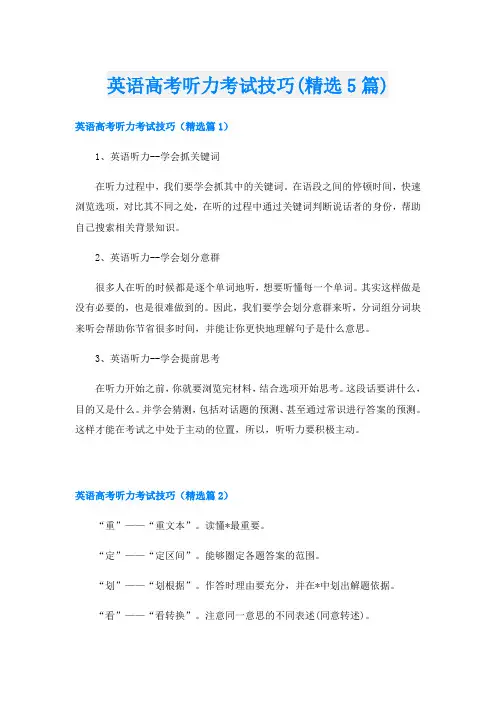
英语高考听力考试技巧(精选5篇)英语高考听力考试技巧(精选篇1)1、英语听力--学会抓关键词在听力过程中,我们要学会抓其中的关键词。
在语段之间的停顿时间,快速浏览选项,对比其不同之处,在听的过程中通过关键词判断说话者的身份,帮助自己搜索相关背景知识。
2、英语听力--学会划分意群很多人在听的时候都是逐个单词地听,想要听懂每一个单词。
其实这样做是没有必要的,也是很难做到的。
因此,我们要学会划分意群来听,分词组分词块来听会帮助你节省很多时间,并能让你更快地理解句子是什么意思。
3、英语听力--学会提前思考在听力开始之前,你就要浏览完材料,结合选项开始思考。
这段话要讲什么,目的又是什么。
并学会猜测,包括对话题的预测、甚至通过常识进行答案的预测。
这样才能在考试之中处于主动的位置,所以,听听力要积极主动。
英语高考听力考试技巧(精选篇2)“重”——“重文本”。
读懂*最重要。
“定”——“定区间”。
能够圈定各题答案的范围。
“划”——“划根据”。
作答时理由要充分,并在*中划出解题依据。
“看”——“看转换”。
注意同一意思的不同表述(同意转述)。
“防”——“防陷井”。
锁定是“true”还是“not true”,辨明形近词。
“读”——“读全项”。
做判断时要通读每一题的所有选项,区分鉴别,选择最佳。
很多同学在英语阅读理解中,都错在了关键的第一步——审题上。
那么到底如何看题干,我们应该看哪里?大部分同学知道,用时间、大写词去定位,但其实这只是最基本的定位信息。
A. 看似松散,一般每篇只有四个问题,实则考查对*中心思想的把握能力。
B. 看似粗线条,根据文中具体信息便可判断正确答案,实则考查句意理解的精确度。
C. 抓住关键句,每段的首句大抵是本段的关键句。
英语高考听力考试技巧(精选篇3)1、集中注意力考生在听英语听力的时候,要稳定自己的心理,这样才能发挥出自己的正常的水平。
而过于紧张焦急的情绪则会容易产生恐惧心理,使听力的反应速度变慢,对把握信息的准确度大打折扣。
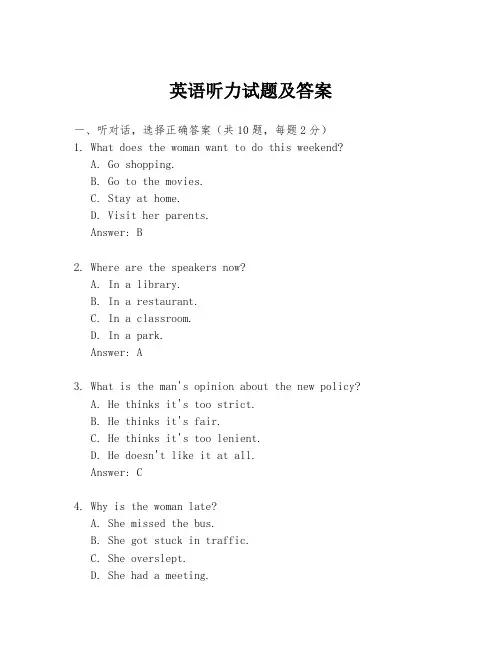
英语听力试题及答案一、听对话,选择正确答案(共10题,每题2分)1. What does the woman want to do this weekend?A. Go shopping.B. Go to the movies.C. Stay at home.D. Visit her parents.Answer: B2. Where are the speakers now?A. In a library.B. In a restaurant.C. In a classroom.D. In a park.Answer: A3. What is the man's opinion about the new policy?A. He thinks it's too strict.B. He thinks it's fair.C. He thinks it's too lenient.D. He doesn't like it at all.Answer: C4. Why is the woman late?A. She missed the bus.B. She got stuck in traffic.C. She overslept.D. She had a meeting.Answer: B5. What are the speakers talking about?A. A new book.B. A new movie.C. A new restaurant.D. A new job.Answer: A6. What time does the train leave?A. At 6:30.B. At 7:00.C. At 7:30.D. At 8:00.Answer: C7. How much does the woman need to pay for the dress?A. $50.B. $75.C. $100.D. $125.Answer: B8. What is the weather like today?A. Sunny.B. Rainy.C. Cloudy.D. Snowy.Answer: A9. Who will be in charge of the project?A. The man.B. The woman.C. The boss.D. The assistant.Answer: A10. What is the woman's major?A. Biology.B. Chemistry.C. Physics.D. Mathematics.Answer: D二、听短文,完成信息填空(共5题,每题2分)11. The lecture is about ________.Answer: environmental protection12. The speaker suggests that people should ________.Answer: reduce their carbon footprint13. One of the ways to protect the environment is by ________. Answer: recycling14. The speaker mentions that deforestation leads to ________. Answer: loss of biodiversity15. The lecture will be held at ________.Answer: the university auditorium三、听长对话,回答问题(共5题,每题2分)16. What is the main topic of the conversation?Answer: Travel plans for the upcoming vacation17. Where does the man want to go?Answer: The man wants to go to the beach.18. What is the woman's concern about traveling during the peak season?Answer: The woman is concerned about the high cost and crowded places.19. What does the man suggest as an alternative?Answer: The man suggests traveling during the off-peak season.20. What is the woman's final decision?Answer: The woman decides to consider the man's suggestion.。
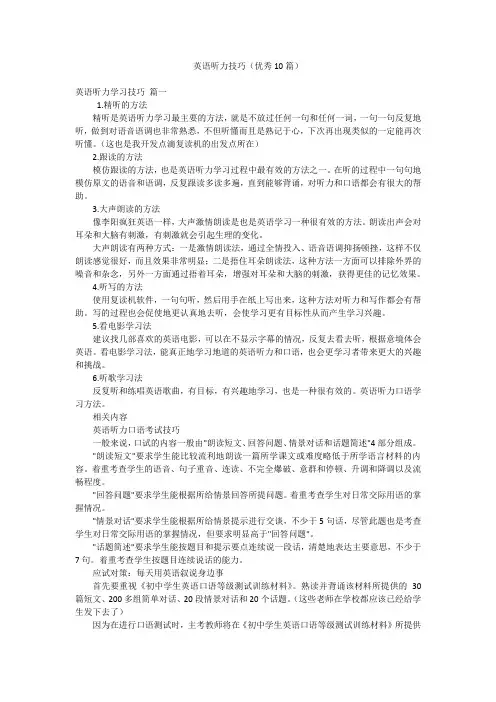
英语听力技巧(优秀10篇)英语听力学习技巧篇一1.精听的方法精听是英语听力学习最主要的方法,就是不放过任何一句和任何一词,一句一句反复地听,做到对语音语调也非常熟悉,不但听懂而且是熟记于心,下次再出现类似的一定能再次听懂。
(这也是我开发点滴复读机的出发点所在)2.跟读的方法模仿跟读的方法,也是英语听力学习过程中最有效的方法之一。
在听的过程中一句句地模仿原文的语音和语调,反复跟读多读多遍,直到能够背诵,对听力和口语都会有很大的帮助。
3.大声朗读的方法像李阳疯狂英语一样,大声激情朗读是也是英语学习一种很有效的方法。
朗读出声会对耳朵和大脑有刺激,有刺激就会引起生理的变化。
大声朗读有两种方式:一是激情朗读法,通过全情投入、语音语调抑扬顿挫,这样不仅朗读感觉很好,而且效果非常明显;二是捂住耳朵朗读法,这种方法一方面可以排除外界的噪音和杂念,另外一方面通过捂着耳朵,增强对耳朵和大脑的刺激,获得更佳的记忆效果。
4.听写的方法使用复读机软件,一句句听,然后用手在纸上写出来,这种方法对听力和写作都会有帮助。
写的过程也会促使地更认真地去听,会使学习更有目标性从而产生学习兴趣。
5.看电影学习法建议找几部喜欢的英语电影,可以在不显示字幕的情况,反复去看去听,根据意境体会英语。
看电影学习法,能真正地学习地道的英语听力和口语,也会更学习者带来更大的兴趣和挑战。
6.听歌学习法反复听和练唱英语歌曲,有目标,有兴趣地学习,也是一种很有效的。
英语听力口语学习方法。
相关内容英语听力口语考试技巧一般来说,口试的内容一般由"朗读短文、回答问题、情景对话和话题简述"4部分组成。
"朗读短文"要求学生能比较流利地朗读一篇所学课文或难度略低于所学语言材料的内容。
着重考查学生的语音、句子重音、连读、不完全爆破、意群和停顿、升调和降调以及流畅程度。
"回答问题"要求学生能根据所给情景回答所提问题。
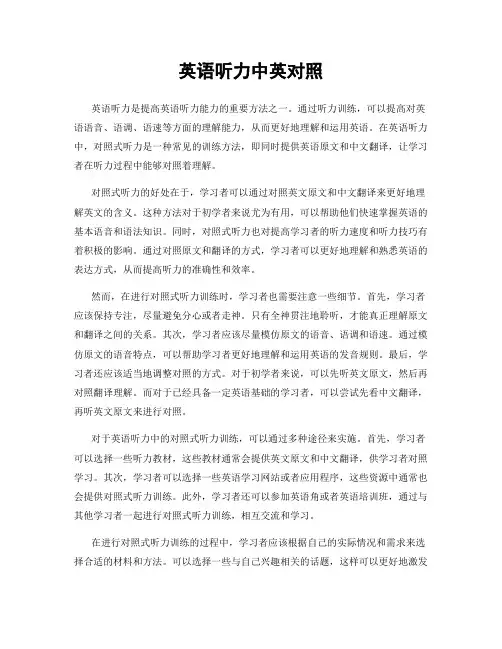
英语听力中英对照英语听力是提高英语听力能力的重要方法之一。
通过听力训练,可以提高对英语语音、语调、语速等方面的理解能力,从而更好地理解和运用英语。
在英语听力中,对照式听力是一种常见的训练方法,即同时提供英语原文和中文翻译,让学习者在听力过程中能够对照着理解。
对照式听力的好处在于,学习者可以通过对照英文原文和中文翻译来更好地理解英文的含义。
这种方法对于初学者来说尤为有用,可以帮助他们快速掌握英语的基本语音和语法知识。
同时,对照式听力也对提高学习者的听力速度和听力技巧有着积极的影响。
通过对照原文和翻译的方式,学习者可以更好地理解和熟悉英语的表达方式,从而提高听力的准确性和效率。
然而,在进行对照式听力训练时,学习者也需要注意一些细节。
首先,学习者应该保持专注,尽量避免分心或者走神。
只有全神贯注地聆听,才能真正理解原文和翻译之间的关系。
其次,学习者应该尽量模仿原文的语音、语调和语速。
通过模仿原文的语音特点,可以帮助学习者更好地理解和运用英语的发音规则。
最后,学习者还应该适当地调整对照的方式。
对于初学者来说,可以先听英文原文,然后再对照翻译理解。
而对于已经具备一定英语基础的学习者,可以尝试先看中文翻译,再听英文原文来进行对照。
对于英语听力中的对照式听力训练,可以通过多种途径来实施。
首先,学习者可以选择一些听力教材,这些教材通常会提供英文原文和中文翻译,供学习者对照学习。
其次,学习者可以选择一些英语学习网站或者应用程序,这些资源中通常也会提供对照式听力训练。
此外,学习者还可以参加英语角或者英语培训班,通过与其他学习者一起进行对照式听力训练,相互交流和学习。
在进行对照式听力训练的过程中,学习者应该根据自己的实际情况和需求来选择合适的材料和方法。
可以选择一些与自己兴趣相关的话题,这样可以更好地激发学习的积极性和主动性。
同时,学习者也应该根据自己的听力水平来选择适当的难度,逐步提高自己的听力能力。
总之,对照式听力是提高英语听力能力的一种有效方法。
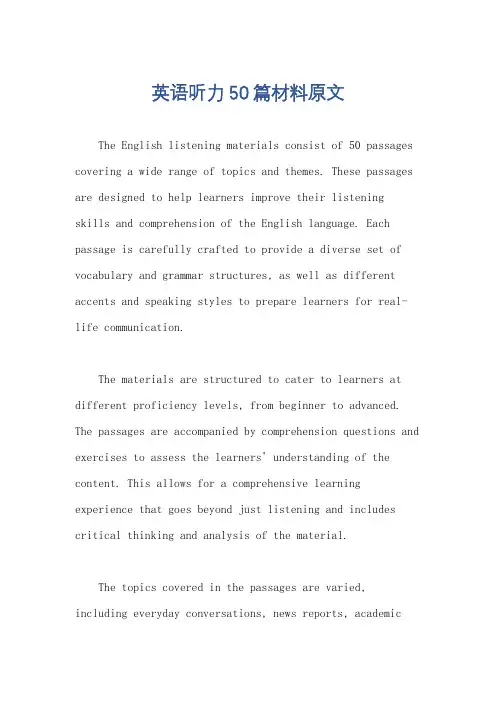
英语听力50篇材料原文The English listening materials consist of 50 passages covering a wide range of topics and themes. These passages are designed to help learners improve their listeningskills and comprehension of the English language. Each passage is carefully crafted to provide a diverse set of vocabulary and grammar structures, as well as different accents and speaking styles to prepare learners for real-life communication.The materials are structured to cater to learners at different proficiency levels, from beginner to advanced. The passages are accompanied by comprehension questions and exercises to assess the learners' understanding of the content. This allows for a comprehensive learning experience that goes beyond just listening and includes critical thinking and analysis of the material.The topics covered in the passages are varied,including everyday conversations, news reports, academiclectures, and more. This diversity ensures that learners are exposed to different contexts and situations, preparing them for real-world interactions in English. Additionally, the materials are updated regularly to reflect current events and trends, ensuring that learners are exposed to relevant and up-to-date content.From a pedagogical perspective, the materials are designed to be engaging and interactive. The passages are carefully selected to cater to the interests and needs of learners, making the learning experience more enjoyable and effective. Additionally, the inclusion of comprehension questions and exercises encourages active participation and critical thinking, which are essential skills for language acquisition.Furthermore, the materials are designed to be flexible and adaptable to different learning environments. Whether learners are studying independently or in a classroom setting, the passages can be used as a valuable resourcefor improving listening skills. Teachers can incorporate the materials into their lesson plans to provide additionallistening practice, while learners can use the materialsfor self-study and review.Overall, the English listening materials provide a comprehensive and engaging resource for learners to improve their listening skills and comprehension of the English language. With a wide range of topics, diverse speaking styles, and interactive exercises, the materials offer a valuable tool for language acquisition and proficiency.。
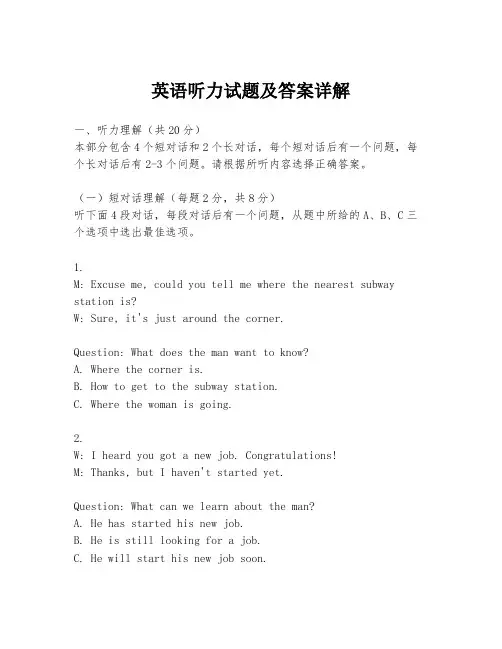
英语听力试题及答案详解一、听力理解(共20分)本部分包含4个短对话和2个长对话,每个短对话后有一个问题,每个长对话后有2-3个问题。
请根据所听内容选择正确答案。
(一)短对话理解(每题2分,共8分)听下面4段对话,每段对话后有一个问题,从题中所给的A、B、C三个选项中选出最佳选项。
1.M: Excuse me, could you tell me where the nearest subway station is?W: Sure, it's just around the corner.Question: What does the man want to know?A. Where the corner is.B. How to get to the subway station.C. Where the woman is going.2.W: I heard you got a new job. Congratulations!M: Thanks, but I haven't started yet.Question: What can we learn about the man?A. He has started his new job.B. He is still looking for a job.C. He will start his new job soon.3.M: I'm going to the library. Do you want to come with me? W: I'd love to, but I have to finish my homework first.Question: What will the woman do?A. Go to the library with the man.B. Finish her homework.C. Help the man with his homework.4.W: The weather forecast says it will rain this afternoon. M: I hope not. I don't have an umbrella with me.Question: What does the man mean?A. He is worried about the weather.B. He doesn't believe the weather forecast.C. He is looking for an umbrella.(二)长对话理解(每题2分,共12分)听下面两段较长的对话,每段对话后有2-3个问题。
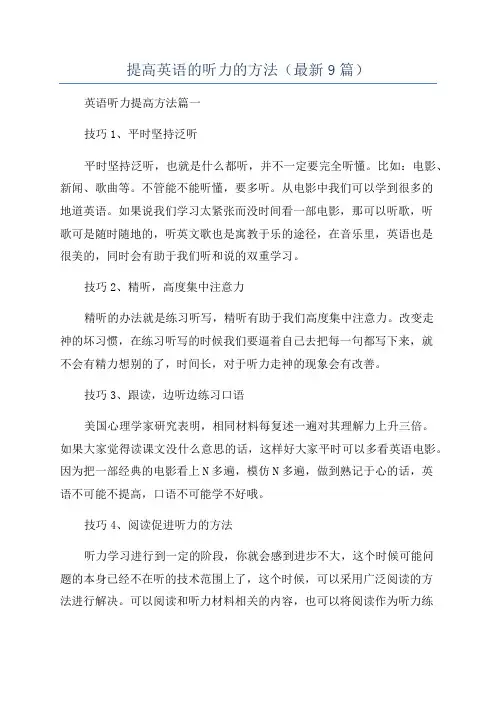
提高英语的听力的方法(最新9篇)英语听力提高方法篇一技巧1、平时坚持泛听平时坚持泛听,也就是什么都听,并不一定要完全听懂。
比如:电影、新闻、歌曲等。
不管能不能听懂,要多听。
从电影中我们可以学到很多的地道英语。
如果说我们学习太紧张而没时间看一部电影,那可以听歌,听歌可是随时随地的,听英文歌也是寓教于乐的途径,在音乐里,英语也是很美的,同时会有助于我们听和说的双重学习。
技巧2、精听,高度集中注意力精听的办法就是练习听写,精听有助于我们高度集中注意力。
改变走神的坏习惯,在练习听写的时候我们要逼着自己去把每一句都写下来,就不会有精力想别的了,时间长,对于听力走神的现象会有改善。
技巧3、跟读,边听边练习口语美国心理学家研究表明,相同材料每复述一遍对其理解力上升三倍。
如果大家觉得读课文没什么意思的话,这样好大家平时可以多看英语电影。
因为把一部经典的电影看上N多遍,模仿N多遍,做到熟记于心的话,英语不可能不提高,口语不可能学不好哦。
技巧4、阅读促进听力的方法听力学习进行到一定的阶段,你就会感到进步不大,这个时候可能问题的本身已经不在听的技术范围上了,这个时候,可以采用广泛阅读的方法进行解决。
可以阅读和听力材料相关的内容,也可以将阅读作为听力练习的辅助方法,大量地阅读小说、杂志、网络文章、新闻报道等自己感兴趣的内容。
阅读是积累词汇的最有效的方法之一提高中考英语听力方法第一步:试听文题,调整心理第二步:积极读题预测,细节莫失选项是听力理解的关键,它可以帮助我们预测将要听到的材料的内容,也可提示所听的重点。
因此听音前五分钟,要看清大小题目要求、问题与选项,不要放过任何一个细节。
在浏览问题和选项时,要尽可能对文章内容和试题答案进行预测,听录音时只要验证自己的预测就可以了例如:1、 This article(文章) is talking about _________ names.A. EnglishB. AmericanC. ChineseD. School2、In “John Henry Brown”,John is the _________ name.A. familyB. firstC. secondD. full3、 English people often put Mr, Mrs and Miss before the_________ name.A. familyB. secondC. firstD. full4、 Many English people have _________ names.A. twoB. threeC. fourD. only one通过阅读题目及选项,我们可以获得这样的信息:这篇听力材料讲的是关于英、美国家人的姓名的短文。
DICTATION 1[00:50.44]Dining Customs in the USA[00:54.14]Americans, like many people elsewhere in the world, [00:58.12]like to invite friends to their homes for an evening of food, [01:02.10]drink and conversation.[01:04.90]Formal dinners in fine homes and hotels in the US[01:08.90]are much the same as formal dinners anywhere in the world. [01:13.50]But as most people in the US have no servants,[01:17.42]their dinner parties at home tend to be informal.[01:21.34]Guests may sit down at a table,[01:23.77]or as many new small homes have no[01:26.25]separate dining room or very small dining space.[01:30.48]Guests can also serve themselves and eat in the living room, [01:34.65]holding their plates or trays on their knees.[01:37.76]A more enjoyable form of entertainment is the picnic. [01:41.79]Americans are great picnickers and[01:44.23]almost every family has a picnic basket.[01:47.90]Summer invitations are often for[01:49.96]a picnic at a park or in the open countryside,[01:53.63]and less hamburgers or hot dogs are cooked over a fire. [01:57.86]Picnic food is usually cold.DICTATION 2[00:50.31]Costs in Colleges and Universities[00:54.66]Nearly all American students in colleges and[00:57.71]universities pay for their educations.[01:01.07]There are many costs.[01:03.44]First of all, there is tuition.[01:06.31]At some schools, the tuition is very high,[01:09.67]ten thousand dollars a year or more.[01:12.80]At other schools,[01:14.18]it may only be a few hundred dollars a year.[01:17.74]At some community colleges, tuition is free.[01:22.11]There are other costs as well.[01:24.85]Many students leave their homes to[01:26.86]go to schools in other cities.[01:29.84]They may live in dormitories or apartments,[01:32.83]and they must pay for it.[01:35.13]Finally, students must buy textbooks for their courses. [01:39.80]Going to college or university can be a big expense. [01:44.67]Some families start saving money for[01:47.25]their children's education when the children are small. [01:51.67]Many students work to save money for tuition.[01:55.71]They can also get loans from the government.[01:58.95]They pay the money back to the government[02:01.12]when they finish their education.DICTATION 4[00:49.96]Rainbow[00:51.51]You will not always see a rainbow[00:53.63]when it rains while the sun shines.[00:56.62]The sun must be in the right position over the horizon. [01:00.72]And remember to turn your back to the sun[01:03.85]when you look toward the sky.[01:05.90]A rainbow will never appear[01:07.92]in the path between you and the sun.[01:10.91]If you are on the ground,[01:13.08]you will only see a part of the rainbow.[01:16.27]This is because the earth blocks the rest of the circle. [01:20.07]You can see the whole circle[01:21.94]if you are flying high in a plane when a rainbow happens. [01:26.43]The shadow of the plane would be in the center.[01:30.22]Rainbows hold an important place[01:32.85]in the traditional stories and beliefs[01:35.75]that make up many cultures.[01:37.94]For example, some cultures say the rainbow[01:40.74]represents a bridge between life and death.[01:44.28]Still others see the rainbow as a sign of good things to come.PART I DICTATION text 1[01:02.23]Plastic[01:03.41]We use plastic wrap to protect our foods.[01:06.40]We put our garbage in plastic bags or plastic cans.[01:10.55]We sit on plastic chairs, play with plastic toys,[01:14.30]drink from plastic cups,[01:16.43]and wash our hair with shampoo from plastic bottles.[01:20.62]Plastic does not grow in nature.[01:23.51]It is made by mixing certain things together.[01:27.01]We call it a produced or manufactured material.[01:31.52]Plastic was first made in the 1860s from plants,[01:35.41]such as wood and cotton.[01:37.72]That plastic was soft and burned easily.[01:41.55]The first modern plastics were made in the 1930s.[01:46.00] Most clear plastic starts out as thick, black oil.[01:50.93]That plastic coating inside a pan begins as natural gas.[01:56.53]Over the years,[01:57.79]hundreds of different plastics have been developed.[02:01.15]Some are hard and strong. Some are soft and bendable. [02:05.91]Some are clear. Some are many-colored.[02:09.90]There is a plastic for almost every need.[02:13.79]Scientists continue to experiment with plastics.[02:17.73]They hope to find even more ways to use them.PART II LISTENING COMPREHENSION1-10 C A D C A C B C B C11-20 A D D D B B B C B D21-30 C B C C C D D C C D[00:16.16]PART I DICTATION text 2[01:01.98]Music[01:02.85]Music is the abstract art of arranging vocal or[01:06.28]instrumental sounds[01:07.62]in a manner that produces a flowing,[01:10.08]unified and thoughtful composition that has melody,[01:14.32]harmony, rhythm.[01:16.25]In contrast to the other arts,[01:18.43]music is not a readily tangible form of expression.[01:22.86]Music may be called both the most mathematical and [01:26.36]the most abstract of the arts.[01:29.30]Unlike words, images, or dance, however,[01:32.82]musical tones in themselves have no concrete associations, [01:37.55]and only gain meaning when they are combined into patterns. [01:42.04]Through the centuries various philosophers have[01:44.79]attempted to integrate theories[01:46.78]on the essence of music with their particular world views. [01:50.92]Many non-Western cultures and some Western writers [01:54.53]as well have perceived it as an inherently mystical force, [01:58.85]able to unlock elemental truths or principles[02:02.27]that cannot be translated into written or graphic form. [02:06.83]Music is an important part of our lives,[02:09.44]and has been an important part of[02:11.50]every civilization known to man.PART II LISTENING COMPREHENSION1-10 A D C C B C D B A D11-20 C C A B A A C C B A21-30 D C D D C D B D A C。
英语听力的重要性首先强调一点,在英语学习中,反复强调的四项基本技能是“听”、“说”、“读”和“写”。
而在这四者中,“听”是排在第一位的,由此可见听力的重要性非同一般。
据统计,人们在语言交际中45%的时间用于听,说占30%,读占16%,写占9%。
因而要想学好一门外语,不仅要进行阅读和写作能力的训练,更要重视听说能力的培养。
现在,在小学阶段、初中阶段、高中阶段以及大学阶段对听力教学越来越关注和重视,人们对其重要性的认识也进一步加深。
经过认真的分析研究,我们发现造成学生英语听力普遍差的原因,主要是以下几个方面:1、缺乏活生生的语言环境,由于受地理位置、周围环境、学校教学条件、家长文化素质等综合因素的限制。
2、缺乏良好的学习习惯。
“嘴勤、手勤、脑勤”是学好英语的关键。
而大量的事实证明:大多数学生在学习过程中不能很好地使手、嘴、脑协调使用。
3、缺乏正确的学习方法。
比如:课前不预习,教师要讲什么,心里没谱;课上听讲,虽然专心,但不善于思考,不认真记笔记;课后缺乏及时复习巩固。
久而久之,这些学生就很难跟上教师的讲课速度,甚至什么也听不懂。
【焦点点击】如何利用我们现有的条件来提高学生的听力水平?1、平时要注意对学生进行语音、语调的专门训练,如句子重音、连读、不完全爆破等。
使学生逐渐了解和掌握地道的英美国家人士的发音和朗读特点。
2、英语也是一门语言,而语言最好的学习场所存在于生活之中。
每天营造听说的环境非常重要。
坚持每天听说,将会是你下一步能否学好英语最为关键的学习内容。
而且决不能三天打鱼,两天晒网。
听说能力的培养贵在坚持。
英语听力试题及答案一、听力理解(共20分)本部分包括两节,每节各有5个问题,每题2分,共20分。
第一节:短对话理解(共10分)听下面5段对话,每段对话后有一个小题,从题中所给的A、B、C三个选项中选出最佳选项,并在答题卡上将该项涂黑。
每段对话读两遍。
1. What does the man want to do?A. Go to the library.B. Go to the cinema.C. Go to the concert.2. What is the weather like today?A. Sunny.B. Rainy.C. Cloudy.3. Where are the speakers?A. In a restaurant.B. In a bookstore.C. In a classroom.4. What does the woman think about the dress?A. It's too expensive.B. It's too small.C. It's just right.5. What time does the train leave?A. At 6:00.B. At 6:30.C. At 7:00.第二节:长对话理解(共10分)听下面一段对话,回答第6至第10五个小题。
对话读两遍。
6. Why does the man want to change his flight?A. He wants to arrive earlier.B. He wants to leave later.C. He wants to save money.7. What is the woman's suggestion?A. To book a hotel room.B. To take a taxi.C. To rent a car.8. How much will the man pay for the flight change?A. $50.B. $100.C. $150.9. What is the man's final decision?A. To change the flight.B. To stay at the airport.C. To rent a car.10. When will the man's new flight depart?A. At 3:00 p.m.B. At 5:00 p.m.C. At 7:00 p.m.二、听力填空(共20分)本部分包括两段长对话,每段对话后有5个空格,共10个空格,每空1分,共20分。
英语听力学习计划9篇英语听力学习计划 (1)1.每天学习英语时间不小于2个小时,每周学习时间不小于12个小时。
其中,考虑出差、工作等因素,安排一天休息,学习天数每周6天,一天时间休息。
2.每天保证一定的听力的时间,至少15分钟的时间,集中注意力,并有意识地去记忆好的句子。
3.日常思考的时候,尝试用英语思考、想问题以培养语感。
4.每天早上早起7:00听一段voa或者bbc的广播新闻,可以在上班路上听,时间不小于15分钟,建议听语速较快一点的文章。
5.每天中午12:30-13:15拿出45分钟用于观看美剧、纪录片等英语短片,也可背单词或句子。
6.每天晚上拿出1个小时进行英文听写,新概念英语背诵,单词记忆,口语练习等内容的学习。
7.每个周末对本周的学习情况进行总结和评论,并以周记的形式进行记录。
细则听力:1.从voa(specialenglish)做起。
每天听写1篇。
一定要坚持。
2.每周坚持看美剧,先从《绝望的主妇》开始。
初步定在每周6晚。
精读:1.学习新概念英语2-3,背诵课文,每周不小于5篇。
2.重点领会作者的写作手法,记忆好的结构性的句子和内容性的句子,根据中文内容进行英文翻译,进行对比。
单词:1.系统背诵四级词汇。
选用星火的四级词汇书。
每周3个wordlist,这样3个月时间可以全部背完。
词汇是重中之重,万万不可轻视!2.利用手机软件背学过的新概念英语单词。
口语:1.每天坚持听以及复述一段交际、商务英语,使用有道英语的对话教材。
2.每周找一个话题进行内容的编写和口述。
剑桥商务英语教程语法:主要还是靠使用中掌握,坚持写英语日记的话,会对语法和词汇都大有好处。
当然有一本语法书也是很重要的。
英语听力学习计划 (2)1、分层听力训练,快速检索有效信息听的第一层是听辨,帮助我们把如流水般的声音同富有意义的“刺激物”区分开来,找出听力材料中有意义的信息,辨别听力中人物及关系;第二层是听知,通过听力来分析听力从下料中包含的节本内容,把握时间、地点、事件的基本脉络;第三层是听记,让我们记住听力材料中设计的数据;第四层是听析,意思就是能够听出里面一些“话里有话”、“弦外之音”不能直接听出的内容。
如何提⾼英语听⼒如何提⾼英语听⼒(通⽤13篇) 听⼒,拼⾳:tīng lì,英⽂:hearing,是指启动听觉器官,接收语⾳信息的⼀种能⼒。
其能⼒运⽤的有效性⼀般取决于倾听是否专⼼。
此外,听⼒还是英语考试的⼀项,考察考⽣对该语⾔的听话能⼒。
以下是⼩编为⼤家整理以下是⼩编为⼤家整理的相关内容,仅供参考,希望能够帮助⼤家!的相关内容,仅供参考,希望能够帮助⼤家! 如何提⾼英语听⼒篇1 我已经任教快⼗年了,发现很多同学英语成绩还⾏。
但是,⼀提到⼝语、听⼒,很多⼈便倍感痛苦,因为我们的听说⽔平体现不出我们学习英语多年的功底,有时甚⾄连最简单、最基本的东西都听不懂、说不明⽩。
有限的听说技能是横亘在很多学⽣求知路上的拦路虎,它使⽆数⼈在TOEFL、TSE以其它国内等级考试中吃尽了苦头。
⽽如今国际性⼤公司纷纷抢滩中国市场,若想在其中谋得满意的职位,英语听说能⼒是必不可少的敲门砖。
许多学⽣都认识到了在英语⼝语和听⼒⽅⾯取得突破的重要性和迫切性,也投⼊了不少精⼒,却收效甚微。
其实,英语听说取得突破并不是那么困难,关键在于掌握⽅法。
若把握住其中真谛,你就会很快体会到随⼼所欲听说英语的乐趣。
下⾯,我就谈谈英语⼝语和听⼒的学习⽅法。
⼀、⼝语的学习⽅法 1.语⾳问题 ⼏乎每个⼈都接受过英语语⾳训练,但是在实际应⽤时,语⾳仍是最让⼈头疼、最难攻克的问题。
若是语⾳不过关,⾃⼰开⼝讲话时就会底⽓不⾜,并且⽆法辨别对⽅的发⾳,听⼒受挫,那么交流就会很困难。
要突破语⾳难关,⾸先要明⽩单个⾳素的发⾳,在此基础上把握连读、略读等⼝语表达时最常见的语⾳现象,进⽽练习英语⼝语的语调和节奏。
练习时要模仿原声录⾳,有条件的还应录下⾃⼰的发⾳,与原声带进⾏对⽐,这样⽐较容易发现⾃⼰的不⾜。
纠正发⾳是⼀个枯燥的过程,只有具备耐⼼、细⼼和恒⼼,才会有进步。
“Well begun is half done”,因此⼀定要有⼀个好的开端。
2.词汇问题 中国学⽣学习英语,词汇量并不是问题,但为什么我们讲话美国⼈有时听不懂呢?关键在于我们掌握的词汇含义,与实际的地道⽤法脱节。
英语听力原文【Text1】W:Oh,another windy day!It's dusty everywhere and I can hardly see anything. It must be dangerous to drive on such days.M:Yes,it has been like this for a week.【Text2】W:Look!The ticket of the film is ten dollars per person.M:But if we have student cards,we can get in for two dollars.W:Really?Let's have a try.【Text3】M:I am so tired of driving all those hours to work.W:Yeah.I know what you mean.I used to drive two hours to work each day.But now,I live within walking distance of my office.I don't even need a bike.【Text4】W:Thank goodness!You're still here.M:What's up?W:I need your signature for this document.It's urgent.【Text5】M:Advanced Physics is too for me.I will probably quit this course. What about you,Penny?W:So will I.You know,I've been busy with the club thing and preparing for my internship interview.【Text6】M:Good morning,madam.I am your guide for this trip.W:How lovely!Could you tell me about the hotel I'm going to stay at?M:Yes,of course.The Grand Hotel opened in1990.And it sits on the seaside along the South Coast Highway.It is the most beautiful hotel here.W:That sounds great.M:And there are some restaurants outside.So,at dinnertime,you'd have a lot of choices.W:That's really nice.I like to have some local foods while traveling.What about the scenery around it?M:The hotel has the best views of the Pacific Ocean.W:Oh,I think I will love this hotel.【Text7】W:My first article has been published in a famous science magazine.They are going to send me a special copy on Friday,but it will be available in1the shops three days later.I'm so glad that they have chosen it to be on the front cover.M:Congratulations!You deserve to be recognized.I will read it on Saturday when the children are at their grandparents'.What are the contents of the article?W:Don't you remember?It's the one about the atom.M:Like the atom bomb?W:No,it's about how they function.I have suggested a new theory which scientists all around the world are now accepting.M:I know,I'm just teasing.Will I understand it?Is it very technical?W:It is,but there are pictures to help explain it.M:Good.I find I absorb information better if there are visual aids to help.WV:I can also explain it to you in simple terms if it doesn't make sense.M:Well,I'm glad I have you to help me grasp it.【Text8】W:Hello,Professor.Could you help me with my entry for the Design Competition?M:OK.Are there any requirements?For example,saving energy or producing no noise?W:Actually that was the focus in former competitions.We have to adopt a creative approach to existing technology this year.M:I see.What is your design?W:A dishwasher.Here is my drawing.M:There's a stone at the bottom.Is that for decoration?W:No.Instead of pushing a button to start,you turn the stone.M:Good,but what makes your design creative?W:My idea is to give pressure to the carbon dioxide so that it becomes a liquid. The liquid is used to clean the dishes.M:A brilliant idea!W:Thank you.I have to give a presentation about the design.I've got detailed drawings and a500-word paper on it,but I am not sure what material is suitable for a model of the machine.M:I see.【Text9】W:What kind of house shall we rent?M:It should be close to our office building.You know we couldn't adapt to getting up early and the closer it is,the later we can get up.W:Yes.That is the most important thing to consider.M:How about the size?W:I am not too worried about the size as long as there is enough sunlight in the bedroom.Do you mind if it is in a noisy area?M:I don't mind.I am not a light sleeper,but a quiet area is better,for we can do our research at home.W:OK,let's pay more attention to the newspapers.M:If we are lucky,we will find a flat in the next few days.By the way,how much do you think the rent will be?W:I have consulted the house agent about the price.He said it would be about two hundred pounds a month.M:Oh,I think the price is reasonable and acceptable.W:I think so.How I wish we could find an ideal flat quickly,because our present house is due.【Text10】Today I'm going to tell you something about manners in different countries.I think you already know that people in different countries have different ways of doing things.Something that is rude in one country may well be quite polite in another.For example,in Britain you mustn't lift your bowl to your mouth and you'd better not make a noise when you are having some liquid food.But in Japan you needn't worry about making a noise when you drink it.It shows that you are enjoying it.In Britain you try not to put your hands on the table at all during a meal.In Mexico,however, guests are expected to keep their hands on the table throughout a meal.But it is in the Arab countries that you really must be careful with your hands.You see in the Arab countries you mustn't eat with your left hand.This is considered to be very impolite.So,what should you do if you visit another country?Well,you needn't worry.You can ask the native people there to help you or just watch carefully and try to do as they do,not as you do at home.。
Unit 3 Work and WorkforcePart I Warming upSection ATape script:1. Psychologis tMaybe the biggest challenge for me is listening to people talk all about their problems. At the end of the day, I’m usually pretty worn out. At times, it can be depressing as well. On the other hand, I do see patients making real progress. It’s great to see someone really turn their life around and get on top of a problem that they thought they never could deal with.2. Comp counselorAs a camp counselor, it’s difficult to find a way to get through to kids with problems and win their trust. Sometimes kids are very suspicious and find it hard to trust an adult—even a young adult. So getting them to open up is the hardest part. Once you’ve done that, they almost become different people. One of the things I find most rewarding is seeing kids develop confidence and a sense of self-worth. It’s especially great to see that happen in a kid who started out the summer with low self-esteem.3. FirefighterIt sounds pretty obvious, but in my job, the biggest challenge is going into a burning building that’s full of smoke when you can barely see a few inches in front of you. It’s really difficult—especially when you know where are people in there, and it’s your job to get them out. Once you do get someone out safely, then you feel really great and you forget about the dangerous the work is.Section BTape script:1. JustinWhat do I hope I’ll have achieved by the time I’m 30? Well, I hope I’ll have made a successful career in the music industry. Right now, I play in a band and I’d love to be able to do that professionally. I plan to form a group of my own in a few years. Once we get known, we’ll record an album—and make music videos, of course —and try to break into the music scene in a big way.2. SophiaI plan to be a doctor. When I’ve graduated from med school and finished with my interning, I want to work overseas for a few years. I’ll probably work in a developing country with an organization like UNICEF. After that, I’ll come back home and work in a hospital. I don't really care if I make a lot of money or not, but I do want to work somewhere where I feel I can make a difference.3. RachelI’m planning to be a model. I’ve already had some modeling experience, and after I graduate, I’m going to see if I can get a job with an agency in New York or Los Angeles. I’ll probably work as a model for then years or so, and then I hope to start a modeling agency or my own.Section CTape script:Job InterviewR—Receptionist S—Steve B—BoushR: Good morning. How can I help you?S: I have an appointment with the personal director Mr. Boush.R: Will you take a seat and I’ll see if he is free yet.S: Thank you.(Later)R: Mr. Li, Mr. Boush will see you now. His office is down the hall to your left.S: Thank you.(Steve introduces himself)S: Mr. Boush, I’m Steve Li.B: Well, hello, Mr. Li.(Extends his hand—they shake hands.)I t’s early and you’ve come a long way just for an interview.S: Yes, sir. We read your ad in the paper and my aunt said that this is a very reputable firm and since I want to be a lawyer someday we thought this job would give me a good start.B: I see. Of course you realize it will be dull for a while. You wouldn't get to practice law right off.S: Oh, I realize that, sir.B: It would be mostly filling, tracking things down and looking things up. All sorts of odd jobs—delivering things to the court house, and bringing things that the lawyers forgot. Even running down to get them a sandwich now and then.S: I wouldn’t mind that, sir. At least I could get the feel of a law office.B: What kind if a lawyer do you want to be, Steve?S: A corporation layer, sir. I’m good at figures.B: Oh! That’s interesting. We can always use a good head for math around here. What grade are you in?S: I’ll be a senior next year.B: And what law school do you plan to go to?S: Harvard, sir.B: Well, that’s setting your mark high enough. You realize this job doesn't pay very much, don't you?S: Yes, sir, but I can get by and like my aunt said I can wait another year before I buya car. Experience and education are more important, now.B: Well, Steve, if you are smart enough to figure that out you are smart enough for this job. When can you come to work?S: Right now, sir! You mean it?B: Yes, you’ve got yourself a job but take a couple of days to get located and find your way around, then come in Wednesday morning at eight sharp.S: Yes, sir! And thank you, sir! I’ll be here!( Later on the phone)S: Hello Mom, is that you? I mean it!Part II Americans at workTape script:The topic of work in the United States is an interesting one because the statistics do not always agree with popular general impressions about American workers and the American economy. I will try to reconcile these impressions with what we know from some recent statistics. To get you warmed up, let me give you a few questions to think about before I start the first point of our lecture today. Do you think most Americans work in factories that produce goods for domestic use and exportation? Do you think most American women are housewives, or do most of them work outside the home? Do you think people in the United States work hard? If time permits, I’ll deal with each of these points in today’s lecture.So, then, where do most people in the United States work? If you thought in the manufacturing sector, in other words in factories, you were wrong. It is true that the United States is, and is seen as, a strong industrial power, but the statistics reveal that another branch of the economy is even stronger than manufacturing. Instead of dealing with the large figures required when discussing a total US workforce of 125 million people, let’s take a look at 100 hypothetical workers and see where they’re employed. Of those 100 workers, 16 work in manufacturing, that is, in producing goods. Another 4 work in construction, and 3 work in agriculture, forestry, and fishing. And 1 out of 100 workers is employed in mining. You might find the figures for manufacturing and agriculture surprisingly low, and in a sense they are. The United States is in fact a leading producer of manufactured goods and agricultural products in the world; however, a surprisingly small number of workers, 16 out of 100 for manufacturing, and only 2 per hundred for agriculture alone, is responsible for this output. The above figures account for 24 of the 100 hypothetical workers we started with. Where do the other 76 work?Well, a full 76 are employed in what are called the service industries. By the way, the term industry often applies purely to production, or manufacturing. Today, however, I will use industry in its more general sense, any general business activity. Service industries, then, include a wide variety of business that provide services rather than produce goods. You know the difference between goods and services, don't you?Let’s take a look at the different sectors of the different sectors of the service industries now. of 76 workers in the service industries, 25 are employed in community, social, and personal services. Community, social, and personal services include doctors’ offices, private hospitals, hotels, computer programming and data processing companies, restaurants, repair shops, engineering companies, and private research facilities. The next largest sector in the service industries, wholesale and retail trade, employs 23 of the 76 people. Wholesale trade involves purchases directly from the producer, while retail trade is more familiar to us: purchases from department stores, supermarkets, automobile dealerships, and so on.The next largest sector in the service industries, the government, employs 17 of those 100 hypothetical workers we started with. The best-known government workersare teachers, police, and postal workers, but this sector also includes government officials and administrators, of course. The next sector is finance, insurance, and real estate, in other words, banks and the stock market, some 55,000 insurance companies, and companies involved in the buying and selling of property. Six of every 100 workers are employed in finance, insurance, and real estate. The last service sector is transportation, communication, and utilities. What does the phrase “transportation, communication, and utilities”make you think of? If you thought of airlines, roads, and railroads for transportation, you are correct. Communication, of course, includes newspapers, magazines, and books as well as TV and radio broadcasting. And utilities, as you probably know, are companies that provide us with gas, water, and electricity. In the United States, these jobs are not part of the government services as they are in many countries; transportation, communication, and utilities are provided by private companies and account for 5 of the 100 workers we began with. Before we leave our first topic, let’s check to make sure you have all the figures for the 76 workers in the service industries; 25 in community, social, and personal services; 23 in wholesale and retail trade; 17 in government; 6 in finance, insurance, and real estate; and last, 5 in transportation, communication, and utilities.Before I discuss the work ethic, I’d like to make a slight digression and get back to the question of working women. Would you be surprised if I said that most of the female population aged 16 and over work? As a matter of fact, the actual figure is 58 percent. The figure for mothers with children under 18 years of age is even higher: 67 percent. That two thirds of mothers are employed certainly has an economic impact on the country and no doubt influences to some extent the character of the American family. But we’ll look at that in a later lecture.Now that we’ve taken care of that digression, let’s talk about our last topic: the work ethic. I asked you earlier if you felt people in the United States worked hard. Well, I’m not sure what your opinion is , but a strong work ethic means that workers take their work seriously. Workers with a strong work ethic feel an obligation to work hard, expect little time for recreation, and take pride in doing their job well. According to surveys, most Americans do have a strong work ethic, that is, they feel they should work hard. The problem is that they do not always do so. And the reason they give for not working harder is that they don't feel they will benefit from the work. Others—like the owners of the company—will benefit instead.Part III Stress managementTape script:H—Host D—Dr. Sander J—JudyH: Good morning, and welcome to “Talk of the Day.” Do you often find that you’re trying to accomplish more in a day than is humanly possible? Do you have trouble falling asleep at night because you can’t stop thinking about yesterday’s activities or planning tomorrow’s? Do you find yourself spending too much time at work without enough time for leisure activities? Today our topic is stress and how to manage it. Tell us about the level of stress in your life and how you cope with it, or call us with your questions. With us to help answer some of the questions youmay have is Dr. Elizabeth Sander, a medical doctor and writer of a best-selling book on stress management. She has also conducted numerous workshops designed to teach people how to identify and prevent stress. Good morning, Dr.Sander. And thank you for joining us today.D: Thank you for having me.H: Dr. Sander, before we take our first call, perhaps you could just tell us what exactly we mean by “stress.” We hear the word being used so much today. What is stress? D: Yes, that’s a very good question. Actually, stress can be either a physical or psychological response, or both, to the demands that we’re placing on ourselves.An increased level of stress affects us physically by producing certain changes in the body such as increased heart or breathing rate, dilation of the pupils, or our blood pressure and sugar level can go up. These are normally responses that are designed to help us, for example, when we’re in danger, but which under other circumstances, for example, when we have a deadline to meet for a project at work, don't really benefit us. Psychologically, we respond to these demands by becoming nervous, irritable, depressed, or even angry.H: Yes, it seems these days we’re constantly listening to each other complain about being stressed out and feeling a variety of these responses you’ve mentioned. Well, let’s see what kind of stress level our callers have. Let’s take a call from Judy in Fallbrook.J: Yes, hello, thank you for taking my call. This is a great topic. You know, I have so many friends who are always complaining about being stressed out. I just don't understand it. I just don't understand what it means to be stressed out. And it seems that I’m just as busy as they are if not more so. Maybe I’m really stressed and just don't realize it. Are there certain warning signs that I can be on the lookout for that will tell me I’ve reached a dangerous level of stress?D: That’s a great question and yes, many people are at dangerous levels of stress without realizing it or they just don't want to admit it because they’re afraid that they would have to change something in their life. Some of the most common warning signs are fatigue, listlessness, sleeping problems—either you can’t fall asleep at night or you wake up throughout the night; you may have a loss of appetite or sudden stomach disorders, and heart palpitations are quite common. So one of the key issues is to help people realize that they are experiencing some of these problems associated with too much stress.J: Well, as I said, many of my friends are aware of their situation, but it seems they never do anything about it. Are there ways that they can make their life less stressful?D: Of course. There are steps that we can take to lower the amount of stress in our lives, but unfortunately many people are so caught up in the cycle of activity and stress that they don't stop to take these important steps. The most important step is that we become aware of potentially stressful situations and avoid them. We can also simply reduce our workload and organize the work that we do have in a better way. Another important step is to get the proper rest and exercise. If you’re undera lot of stress to begin with, very often sleep or exercise can help to release someof that stress and prepare you to take on more. One of the worst things that can happen is to allow the stress to build up. Finally, one of the most effective steps we can take is to find a balance between work and play. In the US it’s been recently discovered that the average American is working more now than we did20 years ago. We have become almost obsessed with work and we have a hardtime enjoying ourselves anymore.J: Yeah, that’s definitely true. Thank you. That information is really helpful.H: OK. Let’s take another call, from Lori in Ramona.Part IV Listen and relaxTape script:S—Steve J—JimS: Jim in Brighton, you are next on RKO.J: Hi, Steve. Been listening to you.S: Thanks. What kind of job do you do?J: I am a postal worker and a mail carrier.S: Oh. Do you like it?J: I do. I like it very much.S: Do you get—now you said you’re a mail carrier—so you get out there.J: I—yes, every day.S: Um hum. That part I think I would like because I don't like being cooped up.J: Yeah, I’m told, from when I got into the Postal Service in the beginning of 1988, that the carriers are the best job.S: Um hum.J: Because we’re out there on the street, and we don't have anybody looking over our shoulders—S: That’s also—J: —for a whole eight hours.S: Yup. You don't have those supervisors with you all that time.J: We’re only in there in the morning. And they’re looking over your shoulder. But I work in Allston, and it’s a very small station, and everybody’s on a name—a first-name—S: Oh, that’s good.J: —basis, and there’s not a lot of stress there. If you want to do your job, you do it, and you do it well, and you don't complain a lot—S: Um Hum.J: —then it’s really an easygoing job, and I do like it.S: That’s good. What do you think the best job would be—ever?J: The best job of any in the world?S: Yeah.J: A food taster!S: Hah! Yeah!J: A traveling food taster, where everything’s a junket.S: Um hum.J: That could be very nice.S: That sounds pretty good. Now your job, obviously you like the outdoors. Do you feel that you like it a little less when those windy, wintry, snowy days come?J: You get used to it, to tell you the truth. But the thing is the heat, in the summertime, gets me worse because in the winter you can always put more clothes on—S: That’s true.J: —but in the summer what are you going to do?S: There’s a limit to how much you can take off and still finish your route.J: And if I could just add a little interdiction here. I married one of my customers.S: No kidding.J: Yes. It was one of those stories right out of the fairy tale books.S: Now let me ask you this. Did she start lingering and happen to be around there around the time that you would come day after day?J: No, no, actually. This is odd, but I met her on a Sunday, and as you know, postal—there is no postal service on Sunday, and I met her on a Sunday just walking through the neighborhood where I deliver the mail, having seen other people who I’d known. And I was introduced to her as one of my other customers, and I would have probably never met her because her job hours are roughly the same as mine, so hadn’t it been for a fluke, of walking around the neighborhood on a Sunday, we wouldn't have met.S: That’s great.J: Yeah.S: And now she gets her mail right on time.J: No, well, we have moved, so I’m no longer her mail carrier, but I’ll always be her mail carrier.(S laughs)J: But I like the job. I know, of course, in the news there’s a lot of things about postal workers who go off, and that’s always a sad thing to hear.S: Yeah, let me ask you that—J: But where I am in, there’s none of that kind of stress. I guess that I work in a small office. Everybody knows everybody, and there’s not as much animosity.S: Sure.J: —from self-respect, to begin with. But the person who doesn't like to go to work under any circumstances, they are not going to like their job even if it is the food taster on a junket.S: You’re right. It’s the attitude, attitude is everything.J: The attitude is first and foremost.S: Well, thanks for the call. I really appreciate it. Yeah, bye, bye.。